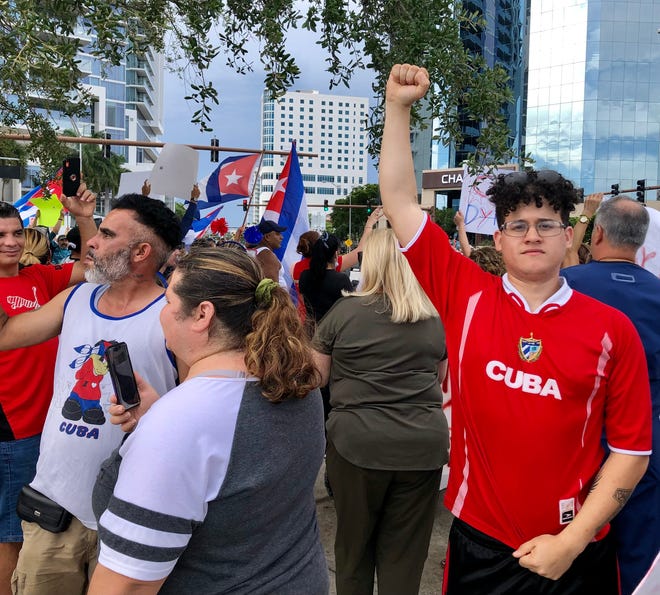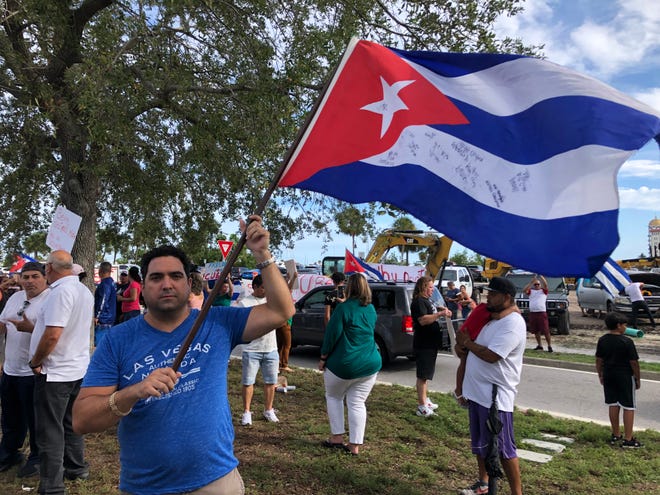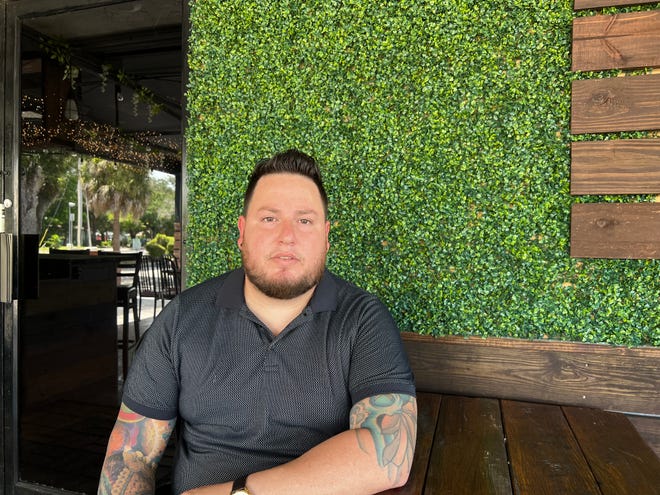Donald Trump shifted Hispanic vote. Can Ron DeSantis hold onto gains?
Donald Trump shifted Hispanic vote. Can Ron DeSantis hold onto gains? Tallahassee Democrat

Florida’s swing state status was put in doubt in 2020 when former President Donald Trump won decisively, and a big part of Trump’s victory was his strong showing with Hispanic voters, especially in Miami-Dade County.
Now one of the biggest questions heading into Florida’s midterm election cycle is whether Republicans can hold onto Trump’s gains with Hispanic voters, a prospect that likely would trigger a wave of GOP victories and cement the view that Florida is now a red state.
Gov. Ron DeSantis is courting these voters with a strategy focused on COVID and culture war issues. His first ad buy was a $5.3 million campaign targeted at Spanish-speaking voters.
US-Latin policies:President Biden’s policy changes toward Cuba, Venezuela roil Florida’s election-year politics
Latino vote:My Democratic abuelos raised me. Here’s why I’m now a Republican running for Congress.
Mid-term elections:‘Texas is a battleground’: Latino voters torn between GOP and Democrats ahead of midterm elections

Leading Florida Democrats, meanwhile, say they have learned from 2020 and are determined not to repeat past mistakes, but some worry there still is not enough investment in Hispanic outreach and enough discipline to stay focused on pocketbook issues and not get drawn into divisive cultural debates.
There also are concerns among Democrats that President Biden’s Latin American policies are not playing well with the state’s diverse Hispanic population, which includes many Floridians with deep ties to Cuba, Venezuela, Colombia and other Latin American countries.
Hispanics made up 17% of Florida’s registered voters in 2020 and their numbers continue to grow. Florida’s most populous county, Miami-Dade, is 69% Hispanic, mostly Cuban, a group with historically high turnout numbers.
For years, Democrats counted on huge victories in Miami-Dade to give them a shot at winning statewide. That support collapsed in 2020.
Hillary Clinton had carried Miami-Dade in 2016 by 29 percentage points, but four years later Biden won the county by just 7 points, a 205,000-vote swing toward the GOP. Trump ended up winning Florida by 373,231 votes.
Trump’s strong performance in Miami-Dade helped him win 46% of Florida’s Hispanic vote, compared with 35% in 2016, according to exit polls.
Can Democrats win back Hispanic swing voters statewide?
Democrats acknowledge that they have almost no chance of winning statewide if they can’t dominate in Miami-Dade and win back Hispanic swing voters statewide.
“If we don’t recuperate our numbers in Miami-Dade back to historic numbers… the math doesn’t work and that goes through the Hispanic community no question,” said state Sen. Annette Taddeo, a Miami Democrat who is running for Congress in a competitive contest in South Florida.
Taddeo was vocal in the run up to 2020 that Florida Democrats were losing the messaging war to Trump and the GOP. The Colombian immigrant still is concerned that her party isn’t doing enough to reach Hispanics in the state.
Florida Republicans have invested heavily in Hispanic outreach and the state’s Hispanic population is more GOP-leaning overall than Hispanics nationwide. But it took Trump, a candidate accused by the left of promoting racist policies targeting immigrants, to really move more Hispanics toward the GOP in larger numbers.
Research by Emerson College helps explain what happened.
‘We did have a good economy’
The Boston-based college, which this year began a deeper analysis of the nation’s diverse Hispanic vote, delved into the political views of Florida Hispanics in May with three focus groups and a statewide survey.
The focus groups included 25 participants. Many mentioned Trump. The former president’s name came up 100 times during the three 90-minute sessions.
One participant called Democrats “the new communist community in the United States” and praised Trump’s “strong leadership.”
In his first term and during the 2020 presidential campaign, Trump railed against socialism and communism and courted Florida Hispanics with hardline policies toward authoritarian socialist regimes in Latin America, especially Venezuela and Cuba, countries many Florida Hispanics have fled.
That message may have helped Trump in Florida, but he improved with Hispanic voters across the country, indicating other factors contributed to his appeal with this demographic.
Multiple focus group participants mentioned Trump’s economic stewardship.
“I personally don’t like Trump’s character but … we did have a good economy, with him as our president, you know?” a 19-year-old woman told the focus group moderator.
An individual who voted for Trump despite opposing his hardline immigration stance also praised how the former president handled economic issues.
“Things were better,” with the economy under Trump, the individual said. “Gas prices were definitely better.”
“When Trump was in office my 401k was through the roof and now it’s like off,” said another focus group participant.
Trump’s economic record appears to be a big factor in his appeal to Florida Hispanics.
Focus group participants said they were willing to overlook some of Trump’s negatives because of the strong economy during his presidency.
Hispanic political behavior:Did Hispanic voters win Florida for Trump?
Hispanics campaign strategizing:Trump bet big on winning the Hispanic vote in Miami and Florida … and it paid off
“It’s very interesting to see in the focus groups that Hispanics are willing to push away some of those social issues with Trump and the things they don’t like, all based on the economy,” said Spencer Kimball, executive director of the Emerson College Polling Research Team.
While COVID-19 derailed the economy during the end of Trump’s presidency, he generally emphasized economic health over public health and resisted COVID restrictions, which may have helped him with some blue-collar Hispanic voters.
Alian Collazos, a Cuban immigrant who works to engage Florida’s Hispanic voters as an adviser to conservative-leaning Libre Action, said Florida has a lot of “middle-income” Latinos who work in tourism and other industries severely impacted by the pandemic. Many of them were opposed to COVID restrictions, he said, and have gravitated toward politicians who share those views.
“In Florida, what we’ve seen over the past two years is a big shift because more and more Latinos and Hispanics feel that they’re losing that freedom in their communities,” Collazos said. “It had a lot to do with the restrictions we saw during COVID.”
Economy top concern

Emerson polled 795 Florida Hispanics and found that 38% rated the economy as their top concern. Housing came in second at 10%. Immigration, a topic Democrats have long campaigned on, barely ranked in single digits.
Florida Hispanics are more aligned with Republicans than Democrats on the economy, according to the Emerson poll, with 35% saying their economic views are closer to the GOP’s positions and 29% saying they favor Democrats on the economy.
That’s a good sign for Florida Republicans heading into the 2022 election cycle Kimball said. There’s no sign that Hispanic support for the GOP has waned, he said.
Instead, the economic malaise brought on by gas prices and overall inflation may have cemented the view among some Hispanics that Republicans are better for the economy.
“I would say the downturn in the economy has crystalized these attitudes toward the Republicans at this point,” Kimball said. “There’s still room for the Democrats to make gains, but I don’t think it’s going to be as locked in a vote as we’ve seen in the last 15 to 20 years.”
DeSantis is pointing to his stewardship of the economy during COVID-19 as an asset in courting Hispanic voters.
During a Fox News town hall in April, DeSantis argued that his push to keep businesses open during the pandemic “was particularly good for our blue-collar workers, many of whom are Hispanic.”
DeSantis also regularly rails about inflation and gas prices during his press conference, and he has slammed Biden’s approach to Latin America, rebuking the president for softening U.S. policy toward Cuba and Venezuela.

The governor and his supporters also believe culture war issues resonate with many Hispanic voters, particularly questions about how issues of sexual orientation and gender are discussed in schools.
“You have a right to send your kid to kindergarten without having transgender ideology injected in the curriculum,” DeSantis responded when asked about his Hispanic outreach efforts during the Fox News town hall.
DeSantis spokeswoman Christina Pushaw also has highlighted “gender lessons for little kids” as a turnoff for Hispanic voters.
U.S. Sen. Marco Rubio, R-Fla., said on Fox News last month that recent GOP gains with Hispanic voters are historic and a product of “working-class common sense.”
“Hispanics don’t want to pay $5 a [gallon for] gas,” he said. “Hispanics don’t want violent criminals running the streets. Hispanics don’t want schools trying to convince their son that he’s their daughter.”
The economy is the most important issue, though, and conservative Hispanic leaders believe DeSantis is poised to hold onto Trump’s gains with Hispanics in Florida because of his stewardship of the economy
“I think (Hispanics) love DeSantis,” said Bertica Cabrera Morris, a Cuban immigrant and longtime GOP activist in the Orlando area who served as a board member of Latinos for Trump. “I think they like what he did during the pandemic — the schools, the opportunities for work, it was very well handled.”
Yucet J. Verona and Robert Ojeda both immigrated to the United States from Cuba as teenagers. Both 37, they work together at the same Sarasota restaurant. Both are fans of Trump.

“He’s got a strong personality, but that’s how you got to be sometimes,” Verona said.
Both Verona and Ojeda like that Trump had a tougher approach to Cuba than Biden, who recently eased some of Trump’s restrictions.
Ojeda voted for Trump twice. He also supports DeSantis.
“I love him,” Ojeda said of DeSantis. “He’s tough too.”
Florida Democrats believe there is an opening to win over Hispanic voters on issues such as affordable housing, and other pocketbook concerns they believe DeSantis hasn’t done enough to address.
Democrats regroup
When Manny Diaz took over as chair of the Florida Democratic Party last year, his background sent a signal that Democrats took their Hispanic voter problem seriously.
Diaz is a Cuban-American who grew up in Miami and became mayor of the city. He is the first Hispanic chair of the party in years.
“By virtue of where I was born and where I was raised I have a little bit of working knowledge, street knowledge, of the issue,” he said. “This is not new to me.”
Diaz pointed to a litany of problems with Democrats’ Hispanic strategy last cycle, including not engaging these voters enough in person and not speaking to working-class Hispanics in a manner, and on issues, that they relate to.
“Democrats have gotten too much into the Ivy League faculty talk, calling people Latinx, whatever that means,” Diaz said, listing off other Hispanic descriptors he doesn’t relate to. “That’s not me and it’s certainly not the working-class Hispanics, which are the ones where we’ve taken the biggest hit.”
On the organization side, Diaz said he has worked to hire field workers from Florida who know the Hispanic communities they’re working in, instead of out-of-state operatives who parachute in with no local knowledge. About half of the party staff is bilingual, he said.
On the messaging said, Diaz said he stresses a focus on pocketbook issues over culture war battles.
“We’ve allowed ourselves to be placed on the defensive, particularly on social issues,” he said, adding: “These are issues we should fight, but not to the exclusion of kitchen table issues”

Many Democratic candidates and activists agree, but it’s not clear whether they have the resources and discipline to execute a strategy that would appeal to Hispanic voters, or if it’s even possible to move large numbers of persuadable voters to their side in the current political climate.
Right message?
One progressive group focused on Hispanic voters that’ still engaged in Florida is Latino Victory, which has endorsed in Florida races and plans to be involved on the ground.
“We cannot build national Latino political power without investing in Florida, this is a state that always needs to be part of equation,” said Yvonne Gutierrez, the group’s managing director.
Latino Victory is backing Taddeo in her Miami congressional race, which is ground zero for the battle over Hispanic voters statewide. A strong showing by Democrats in that race would help shore up their Miami-Dade base of support and build the coalition they need statewide. Taddeo faces a Cuban American incumbent, U.S. Rep. Maria Elvira Salazar, who’s well known because she’s a former Spanish-language TV journalist.
She believes: Annette Taddeo launches 67-county campaign for Florida governor with RV tour

Honing in on the right message is key, Gutierrez said.
“Latino voters in Florida, they are persuasion voters, we know that,” she said. “They must be persuaded the issues that matter to Florida’s Latinos voters are issues that matter to Democrats… They care about bread-and-butter issues.”
Taddeo is arguing that GOP leaders have don’t enough to develop affordable housing in Miami-Dade, one of the most expensive housing markets in the nation and one that’s also rated as among the most overpriced.
At the same time, though, she is navigating around the Biden administration’s Latin American policies, which are unpopular with some in her district. She was particularly vocal recently in opposing a softer stance toward the regime of Nicolás Maduro in Venezuela, saying: “The administration cannot give credibility to tyrants like Maduro and then wonder why Hispanic voters are departing our party in record numbers.”
Taddeo played down her disagreements with Biden in a recent interview, but made it clear she’s concerned her party still hasn’t fully grasped its Hispanic voter problem.
Hispanic engagement among Democrats is “definitely, across the board, I’d say not enough,” Taddeo said, noting that the GOP has a sustained Hispanic outreach program in South Florida that operates regardless of whether it’s an election cycle. The Republican National Committee has three Florida community centers — in Tampa, Doral and Orlando — targeting Hispanic voters. Each has a paid employee.
“They are very much aware how Miami-Dade can influence the rest of the country,” Taddeo said of Republicans. “We only show up and invest at election time and that is not a sustainable model.”
Follow Herald-Tribune Political Editor Zac Anderson on Twitter at @zacjanderson. He can be reached at zac.anderson@heraldtribune.com



